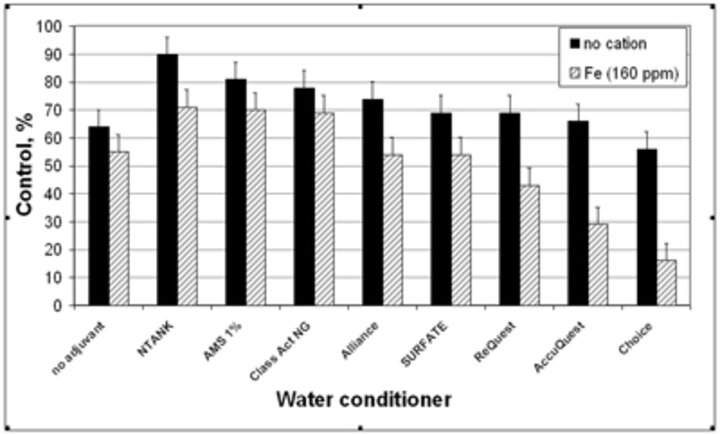April 20, 2007
A myriad of AMS substitutes (sometimes called water conditioners) and other adjuvants have been developed in response to difficulties associated with handling granular AMS and getting it to dissolve in the spray tank. (See related story, AMS - What Is It Doing in My Tank). Most of these substitutes contain a small amount of AMS in addition to a number of proprietary products, such as surfactants, anti-foaming agents, etc.
|
Why do some water conditioners work better than others? One factor is the amount of AMS in the water conditioner (AMS substitute). Extensive university research has shown that 8.5 lb AMS/100 gal is necessary for optimum glyphosate efficacy in most water sources. In some cases, 17 lb/100 gal is necessary because the water is harder or the weeds are more difficult to control. These rates represented the amount of NH4+ from AMS needed to block Ca2+ and Fe3+ from binding to the glyphosate. When there is less AMS in solution, more glyphosate binds to the Ca2+ and Fe3+, and glyphosate activity is reduced.
|
In Figure 1, at the 2.5% v/v rate of Class Act Next Generation (Class Act NG) resulted in glyphosate performance similar to glyphosate+AMS. At that rate, it provides 8.5 lb AMS/100 gal. However, at the lower rates (all other water conditioners), especially below 1% v/v, there was not enough AMS (less than 3.4 lb/100 gal) to adequately counteract the Fe3+ in the water, with the exception of NTANK.
What is the take-home lesson of this research? Producers should be aware of how much AMS they are getting with an AMS substitute, and should make sure it is enough to adequately counteract the Ca2+ and Fe3+ present in their water. To get enough AMS from an AMS substitute, a rate of 2.5 gal/100 gal or higher may be necessary, if allowed by the product label.. This represents an amount far greater than the 1-4 qts/100 gal recommended on most labels.
Similar research was conducted by weed scientists at Kansas State University. Their data may be viewed in a brief research summary at http://www.oznet.ksu.edu/weedmanagement/Dallas%20Files/MS200501&8%20FD.pdf (PDF 19.6 KB)
Mark Bernards
Extension Weed Specialist

